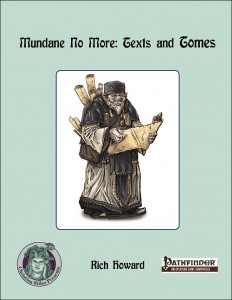Mundane No More: Texts and Tomes
Mundane No More: Texts and Tomes
This pdf clocks in at 21 pages, 1 page front cover, 1 page editorial, 1 page ToC, 1 page SRD, 1 page blank back cover, leaving us with 17 pages of content, so let’s take a look!
I’m a bibliophile and utterly OCD when it comes to the topic – take away my reading material, and I start becoming grumpy – fast. I become slightly concerned whenever either my regular non-RPG-book-pile or my pdf-pile shrinks to below ten unread works. Hence it should come as no surprise that my game somehow reflects this – observers have jested that my game sports an inordinate amount of reading when compared to most PFRPG-games and this has a reason – I *never* liked the very broad quantum-knowledge PCs enjoy; yes, it is nigh impossible to properly depict all knowledge they ought to have, but at the same time, I took a cue from CoC ages ago and started devising tomes for PCs to read so their PCs actually *know* a topic. Unlike many games, the first Knowledge-check tends to provide information on a very broad, general basis, with further information requiring books, research etc. – when Rogue Genius Games’ Investigator provided research rules, I loved the class for it and still do. Well, this here can be considered a similar take on the topic, though one more complex than one would assume at first glance.
First of all, texts are grouped into 4 categories – simple, learned, scholarly and enlightened. Consulting an appropriate text confers bonuses upon the related endeavors of the PCs – usually the new research bonus type is used, though thankfully alternate codification as circumstance or competence bonuses is also covered. Texts can be sued as reference – in order to do so, one has to spend 1/10 of the books’ listed studytime to familiarize oneself with the text and referencing takes 5 rounds per +1 of the bonus conveyed to a given skill-check. Referencing also allows you to perform untrained Knowledge-skill checks with a DC of 10 or higher. Research bonuses from multiple texts do not stack, though -something to bear in mind, should you choose to substitute the research bonus type with another one. If this sounds complex, rest assured, it’s not – an easy table helps with the task at hand.
As a cool idea, a whole page is devoted to dungeon guides, i.e. treatises on certain complexes – which ties in perfectly with the Pathfinder organization and finally provides a very good reason for the chronicles to be so sought-after by various adventurers of all stripes! Creating your own dungeon guides is covered in nice and concise details. And yes, they have an accuracy score, so you can still find terrible guidebooks – think of it as sloppy or outdated travel guides…unpleasant indeed.
As an optional rule, finer grading for alchemical recipes can be found herein as well, unlocking new alchemical items by recipe – which is another thing I’m already doing in my home campaign. And since Paizo has recently added a whole bunch of cool basic alchemical traditions, this allows a DM nice control as well as a cool means of rewarding PCs for their travels and dedication to the craft. better yet, armors and shields, potions weapons – all of the diverse crafting results can potentially be broken down via recipes into a more organic form, a more believable and concise presentation: Think about it, why should every blacksmith know how to make xyz? They will specialize and the same holds true for magically adept characters. Of course, this also opens cool hooks for quests: “No, I don’t know how to make this enchantment, you’ll have to cross the thunder peaks and find the Crippled Smith that is said to have been bound by the giants to weave their plate…”
Examples for concise text generation can be found herein as well, and we receive a new trait (with trait-subclass, but sans trait bonus type) and a total of 6 new feats centered on the topic of the written word – and yes, this includes a shorthand for magic for quicker scroll scribing.
The pdf also contains quite an impressive array of different sample texts of each category.
Conclusion:
Editing and formatting are very good, I noticed no rules-relevant glitches. Layout adheres to a no-frills 2-column b/w-standard with thematically-fitting b/w-art and the pdf comes fully bookmarked with nested bookmarks for your convenience.
Rich Howard’s “Mundane No More” is a glorious little pdf, one of these hidden gems that are easily overlooked, but shouldn’t be. The rules herein make bookish characters work better, make the trip to the sage more compelling and generally increase the immersion into a given fantasy world. While personally, I enjoy a more active research (with rolls), combining this pdf’s rules with Rogue Genius Games’ research rules is extremely easy.
So yeah, this is one of the hidden gems, a great file and well worth 5 stars +seal of approval!
You can get this inspired hidden gem of a pdf here on OBS!
Endzeitgeist out.


1 Response
[…] when a colleague told me that a reviewer whom I have a lot of respect for recently gave T&T a wonderful review. I’m grateful to EZG both for the review and for pulling those ideas off the back-burner […]